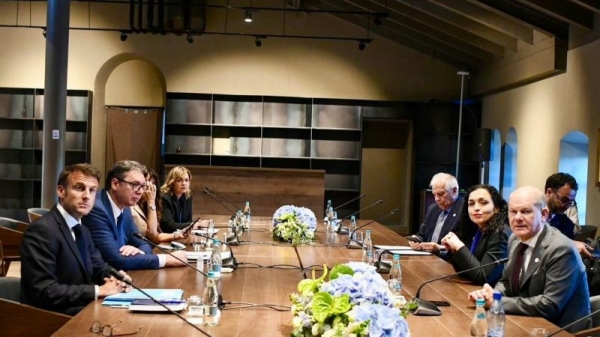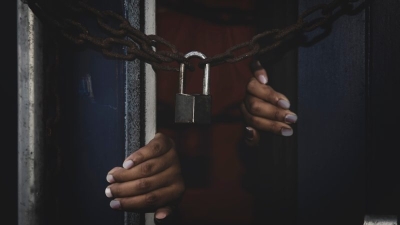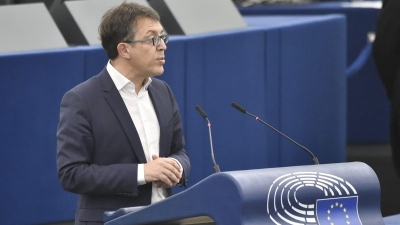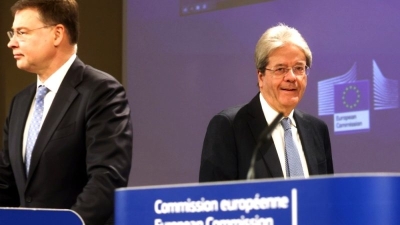France, Germany urge new elections as Kosovo, Serbia meet to defuse tensions

Kosovo and Serbia held talks on Thursday (1 June) under European pressure to resolve a political crisis that has spiralled into violence over the past week, with France and Germany pressing them to take swift steps to reduce tensions.
Kosovo’s Vjosa Osmani and Serbia’s Aleksandar Vučić met briefly in the presence of French President Emmanuel Macron and German Chancellor Olaf Scholz, and the EU‘s chief diplomat Josep Borrell on the sidelines of the European Political Community summit in Moldova.
Earlier in the day, neither leader wanted to meet before relenting under international pressure.
The situation in the Serb majority north of Kosovo deteriorated on Friday (26 May) when Kosovo authorities, backed by special police units, installed ethnic Albanian mayors in offices in northern municipalities.
The mayors were elected in a special election after Serb officials resigned en masse in November 2022. While the elections were considered legitimate by the international community, the turnout of around 3.5% led to calls to refrain from forcing the ethnic Albanian mayors into their offices.
The move resulted in protests and clashes that wounded more than 30 NATO peacekeeping troops and protestors, Kosovo police, and journalists.
Fresh elections as solution
Speaking after the talks in Chișinău, Macron and Scholz called for fresh elections in the four disputed northern Kosovo municipalities with Serb participation “as soon as possible”.
Macron said Osmani and Vučić agreed to consider a plan presented by France and Germany to appease tensions in Kosovo, which would include a commitment by Pristina to hold fresh elections in the contested areas and a commitment by Belgrade to encourage participation in those local elections.
Serbia had urged ethnic Serbs in Kosovo not to participate in the vote.
He said they also urged Kosovo to commit to creating an association of Serb municipalities, seen as a way to give Serbs in the north more self-government.
The two leaders would be expected to hold consultations and respond to the proposal next week with “clear answers”.
“There have been in northern Kosovo tensions that were due to the regrettable holding of polls even though the conditions were not fulfilled to guarantee proper process – this led to an escalation of violence,” Macron told reporters in Chișinău.
“It’s a very serious situation (…), and we had an intense debate on the challenges on the ground. All stakeholders need to show courage,” Scholz told reporters in a separate press conference, appealing to both sides to show responsibility.
“It’s important that everyone involved does everything possible to get to a de-escalation,” he added.
The EU earlier said the rising tensions between Serbia and Kosovo threaten an EU-brokered deal on the normalisation of relations between the two Balkan countries.

EU ups the pressure to calm Kosovo-Serbia tensions
The EU aims to use the European Political Community summit in Moldova on Thursday (1 June) to tackle the rising tensions between Serbia and Kosovo that threaten an EU-brokered deal on the normalisation of relations between the two Balkan countries.
Borrell said after the meeting, the EU requested new local elections ensuring the participation of Kosovo Serbs and the start of the work to establish the Association of Serbian Majority Municipalities as agreed in the EU-facilitated dialogue.
“Failure to do so will have serious consequences for our relations,” he said.
NATO, meanwhile, said it is ready to send more troops to Kosovo after the unrest after pledging 700 this week.
“NATO will remain vigilant. We will be there to ensure a safe and secure environment and also to calm down and reduce tensions”, NATO Secretary-General Jens Stoltenberg told reporters on the sidelines of a NATO foreign ministers meeting in Oslo the same day.
Speaking to reporters in Oslo on Thursday, US Secretary of State Antony Blinken called on Kosovo and Serbia to “take immediate steps to de-escalate tensions and make a real effort on normalisation agreements.”
“We support the European integration process for Kosovo and Serbia, but the current escalation hinders, rather than helps, the efforts in that direction,” Blinken said. “We’re looking for both to act responsibly.”
Blame game continues
Speaking on the sidelines of a European summit in Moldova, Vučić said withdrawing the mayors would be the “most powerful” way to defuse tensions, insisting that his country would “attempt to persuade Serbs to protest calmly and peacefully”.
“Serbia will do its best and its utmost to de-escalate the situation, which means that we’ll try to persuade Serbs to progress calmly and peacefully,” Vučić said.
“They’re very determined (…) They want to see the back of the special police units,“ he said, declaring the Kosovo special police units were there illegally.
Osmani, for her part, speaking to reporters after the brief talks with Vučić, said Belgrade was trying to destabilise Kosovo as it had failed to come to terms with Kosovo’s 2008 declaration of independence from Serbia.
She accused Serbia of backing criminal gangs in northern Kosovo – an allegation Belgrade has denied – and the Serbian leader in particular of “whining and complaining and (…) not telling the truth”.
However, Osmani said Kosovo could hold new elections in the north with Serb participation if they were triggered legally, which would fulfil one of the conditions set out by Macron and Scholz for resolving the tensions.
“What is crucial at this point is that Serbia stops supporting these criminal gangs that are causing most of the problems in Kosovo’s north, but also beyond in our region,” Osmani said.
Osmani said, “A solution for de-escalation is very close,” but Belgrade would also have to respect commitments it made under the EU-brokered deal sealed in March on the normalisation of relations between both sides.
“We need to ensure that the focus is on the full implementation of the agreement, not just parts of it,” she said.
Read more with EURACTIV




